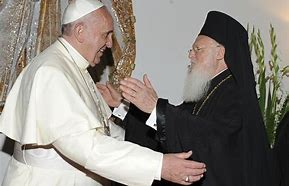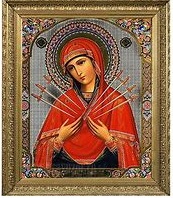 |
 |
 |
Under Ottoman rule, who twice before had had their own Patriarchate, were gradually brought under the control of ethnic Greek bishops as part of a general hellenization of their ecclesial life. In 1767 they were placed directly under the jurisdiction of the Greek Patriarch of Constantinople.
In the 19th century, when a struggle to obtain ecclesiastical independence from the Ecumenical Patriarchate was gaining momentum, some influential Bulgarian Orthodox in Constantinople began to consider union with Rome as a solution to their problem. They thought that as Catholics they would be able to retrieve their national ecclesiastical traditions which they felt Constantinople had denied them.
In 1861 they sent a delegation, headed by the elderly Archimandrite Joseph Sokolsky, to Rome to negotiate with the Holy See. These talks were successful: Pope Pius IX himself ordained Sokolsky a bishop on April 8, 1861, and named him Archbishop for Bulgarian Catholics of the Byzantine rite. The following June he was recognized as such by the Ottoman government. But in June 1861, almost immediately after his return to Constantinople, Sokolsky disappeared under very mysterious circumstances, was forced to travel to Odessa on a Russian ship, and spent the remaining 18 years of his life in the Monastery of the Caves at Kiev. The exact details of this episode have never been revealed.
Nevertheless, having successfully identified itself with the Bulgarian nationalist movement, the Bulgarian Byzantine Catholic Church initially gained about 60,000 members. The Russian government, meanwhile, began to support the establishment of a separate Bulgarian Orthodox Church within the Ottoman Empire. This effort bore fruit in 1870 when a separate Bulgarian Orthodox Exarchate under the Patriarchate of Constantinople was set up. This effectively put an end to the movement towards Catholicism, and before the turn of the century, three quarters of the Bulgarian Byzantine Catholics had returned to Orthodoxy.
Most of those who remained Byzantine Catholic lived in villages in Macedonia and Thrace. Therefore in 1883 the Holy See created a new ecclesiastical organization for them. Apostolic Vicariates were established in Thessalonika for Macedonia and in Adrianople for Thrace, while an Apostolic Administrator with the title of Archbishop remained in Constantinople. The community suffered grievously during the Balkan Wars of 1912-1913, and the few surviving members fled to the new Bulgarian kingdom for safety.
Given this new situation, the Holy See reorganized the Bulgarian Byzantine Catholic Church in 1926: the previous ecclesiastical entities were abolished, and a new Apostolic Exarchate was established in Sofia. This was accomplished with the support of the Apostolic Visitator (1925-1931) and later Apostolic Delegate (1931-1934) to Bulgaria, Archbishop Angelo Roncalli, subsequently Pope John XXIII. He also supported the opening of an interritual seminary in Sofia in 1934 which was directed by the Jesuits until it was closed in 1945.
Especially in the early years of communist rule, the Bulgarian Byzantine Catholic Church suffered vicious persecution along with the Latin Church in the country; a number of clergy and laypeople were executed or sentenced to long terms in prison. The situation would improve somewhat after the election of John XXIII and again in 1975 for celebrations of the 1,100th anniversary of the Christianization of Bulgaria. Unlike most other Eastern Catholic churches in Eastern Europe, this church was not officially suppressed during the communist regime in Bulgaria, although it had to deal with severe restrictions.
Since the downfall of communism, the Byzantine Catholic Church in Bulgaria has been able to function freely and has regained much of its property. By 2006 the Apostolic Exarchate had 21 parishes and was served by the same number of priests and 41 female religious. In 2002 the Holy See approved the statutes of a new Bulgarian Catholic Bishops' Conference that includes the two Latin dioceses in the country (Sofia-Ploviv and Nikopol) as well as the Apostolic Exarchate.
Location: Bulgaria
Head: Bishop Christo Proykov (born 1946, appointed 1995)
Title: Apostolic Exarch for Catholics of the Byzantine-Slav Rite in Bulgaria
Residence: Sofia, Bulgaria
Membership: 11,000
Website: www.catholic-bg.org
Last Modified: 31 Jul 2007